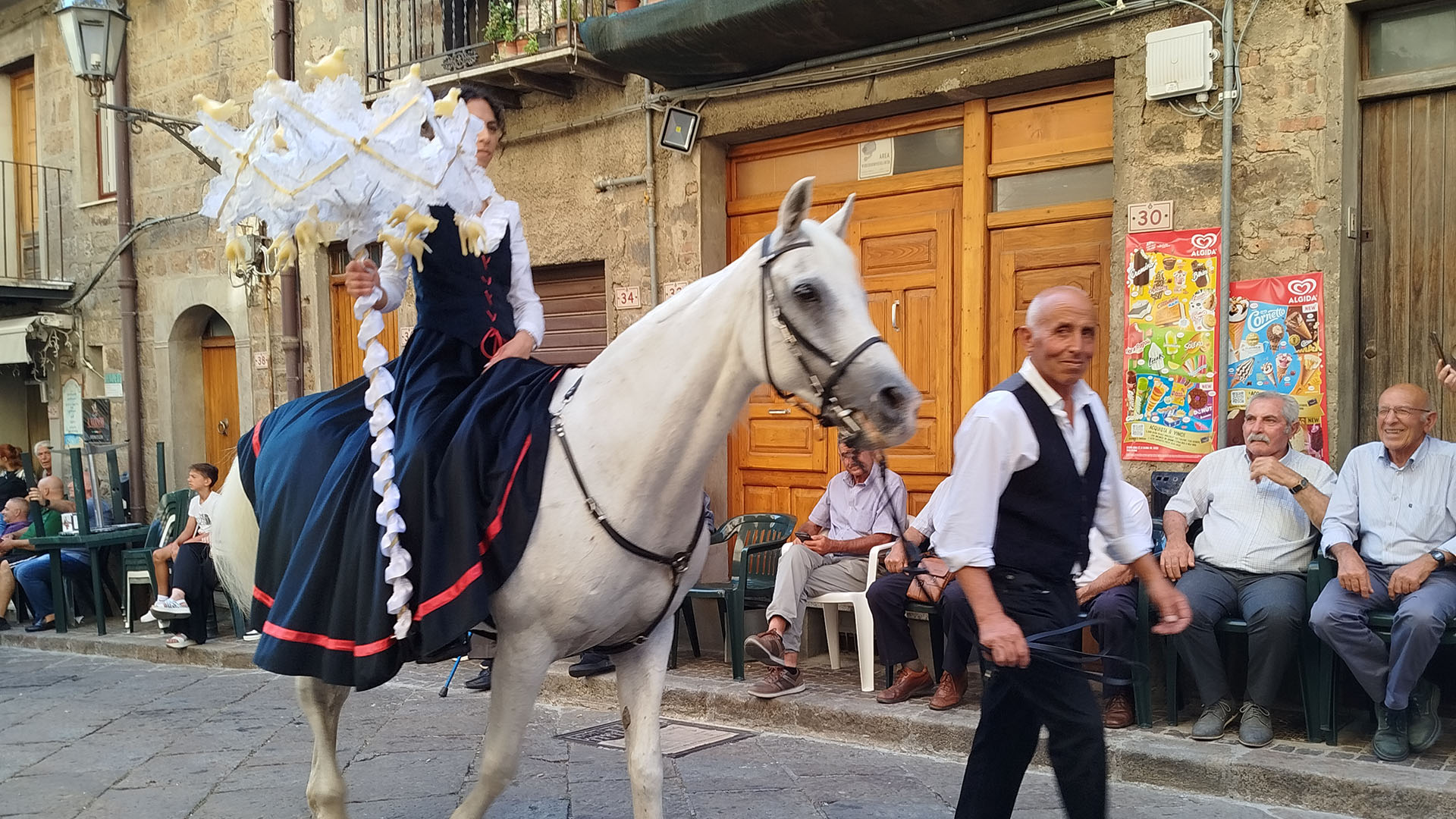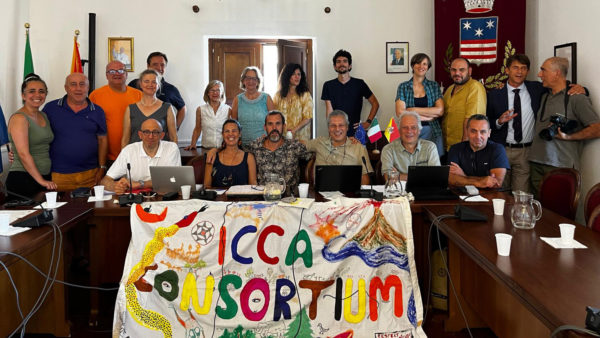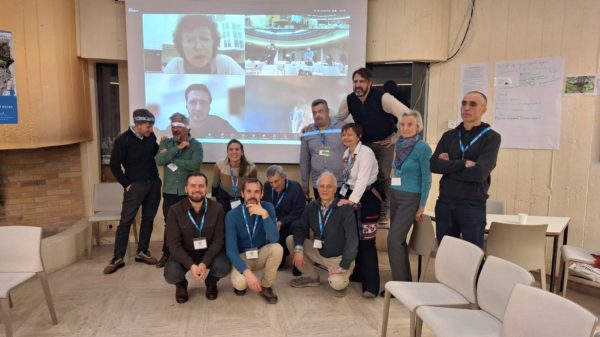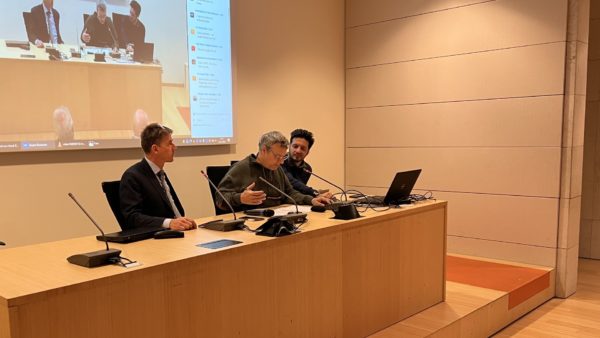The event brought together researchers from the Universities of Palermo, Padua, and Trento, as well as representatives of national and international biodiversity conservation organizations, local administrators, pastoral associations, and research centers on Italian collective lands
First published on 09/08/2025, and last updated on 02/26/2026
By Federico Bigaran, Honorary member, ICCA Consortium, and Eleonora Fanari, Regional Coordinator for Europe, ICCA Consortium
On July 19 and 20, the historic village of Geraci Siculo, located in the Madonie Park on the island of Sicily, Italy, hosted a two-day meeting focused on the crucial role of Local Communities as custodians of collective lands, biodiversity, and territories of life. The event brought together researchers from the Universities of Palermo, Padua, and Trento, as well as representatives of national and international biodiversity conservation organizations, local administrators, pastoral associations, and research centers on Italian collective lands. It aimed to exchange knowledge and identify strategies to strengthen the role of local communities in protecting biodiversity.
The renovated Augustinian Convent, the medieval village of Geraci Siculo—considered one of the most beautiful in Italy—and the Madonie Park offered a magnificent setting for the event. During those days, the village also hosted the “Carvaccata di Vistiamara,” a ceremonial cycle through which the pastoral community of the village emerges as an identity reference for the community as a whole. This ritual, documented since 1643, is celebrated every seven years on the third Sunday in July.
The conference opened with institutional greetings delivered by the representatives of the three organizations supporting the event: Mayor Luigi Iuppa of the Municipality of Geraci Siculo, Ali Razmkhah of the ICCA Consortium, and Marco Bassi of the RuComItaly project.
The first session, “Insights from Southern and Northern Italy (RuComItaly),” presented preliminary results from the project “Valorising rural commons for a greener and fairer society.”This is a Nationally Relevant Research Project (PRIN) that adopts an interdisciplinary approach to understanding the diverse ways in which civic uses and collective land rights are interpreted and practiced across Italy. Recognizing the important role of collective lands in biodiversity conservation and the management of agro-silvo-pastoral resources is the broader context in which the project is framed.
Prof. Andrea Bonoldi of the University of Trento analyzed the historical and institutional experience of the Magnifica Comunità di Fiemme, examining the factors that enabled the long-term persistence of this ancient community, its present-day relevance, and prospects, thanks to a unique form of environmental heritage management. Prof. Christian Zendri of the University of Trento shared his expertise on the legal transformations affecting collective lands in Italy, focusing on the shift from “liquidation” to the recognition of collective rights, and the gradual acknowledgment of the importance of rural collective property for environmental protection.
Dr. Giacomo Pagot and Prof. Paola Gatto of the University of Padua discussed “traditional ecological knowledge.” They applied advanced methods to assess how the persistence of collective lands supports the maintenance and transmission of ecological knowledge within Local Communities.
Dr. Giorgio Scalici of the University of Palermo presented ethnographic research on civic uses in Sicily, showing both strengths and weaknesses. Through interviews and participant observation in community life, he documented the dynamics and self-organization strategies used to protect and maintain civic land rights in virtuous contexts, such as Geraci Siculo and the Madonie area. To conclude, Prof. Alessandra Pera integrated historical-legal studies on civic uses and collective lands in Sicily with a critical review of a regional bill currently under discussion, aimed at aligning Sicilian legislation with National Law 168/2017. This is a key legislative step toward revitalizing heritage and civic rights, which are currently denied in much of the regional territory.
Another world is possible: alternatives from Southern Europe
Prof. Pera’s intervention introduced the second session, a debate entitled “Another World is Possible,” featuring representatives of Italian collective land organizations. Carlo Ragazzi, President of both the Italian Federation of Collective Lands “Pietro Nervi and Paolo Grossi” and the Consorzio degli Uomini di Massenzatica, described the dynamic management of the Po Delta collective land, which spans 353 hectares and involves 600 member families, combining agricultural use, social projects, and environmental enhancement. The consortium reinvests profits in inclusive development projects and has received the Council of Europe’s National Landscape Award.
Federico Bigaran of the Italian Network of territories of life stressed the importance of territories governed by Indigenous Peoples, and Local Communities—such as collective lands—for conserving biocultural diversity, nature, and landscapes. These territories integrate natural and cultural heritage with community livelihoods, sustaining intergenerational knowledge, biodiversity, landscapes, cultural values, and customary norms.
Marta Villaand Mauro Iob of the University of Trento’s Centro studi e documentazione sui demani civici e le proprietà collettive used an imaginary dialogue to illustrate the values and importance of self-determination and self-management in territory governance, also revealing conflicts and threats to community rights. Bartolo Vienna, former mayor of Geraci Siculo, shared experiences of safeguarding and revitalizing civic uses to support transhumant pastoralism, deeply rooted in the territory and now coexisting with the Madonie Park’s conservation objectives. The presence of younger generations engaged in pastoralism offers hope for the future. His talk sparked a lively debate on the specific issues of civic uses in Sicily.
Policy recommendations
The policies to be adopted to support collective domains following the enactment of Law 168/2017 were the focus of the afternoon session of the conference—a workshop facilitated by Erica Frassetto and Chiara Spotornoof Etifor–Valuing Nature, one of the activities of the RuComItaly project.
The first part was devoted to explaining the working method and the main contents of the recommendations developed for collective domains with representative bodies. The key messages were as follows:
- Collective lands are a community-based, intergenerational model of territorial care.
- Law 168/2017 marked significant progress but faces barriers: limited legal awareness, coordination challenges, and restricted funding access.
- Solutions: invest in training and awareness, encourage aggregation among entities, improve funding access, and promote collaborative dialogue with institutions.
The second part of the workshop was dedicated to a discussion with all participants on selected themes for developing recommendations for contexts where usi civici (customary civic uses) prevail. Still, representative bodies have not yet been established. The debate addressed issues that remain highly problematic in certain situations—such as relationships with institutions managing protected areas. Particularly relevant in this regard was the contribution of Virgilio Morisi and Dario Novellino, who shared the difficulties faced by pastoral enterprises holding usi civici rights operating within and around the Abruzzo National Park.
Network strategy and ICCA Registry
The second day, in the municipal council chamber, was dedicated to training and planning for an Italian national network of territories of life, facilitated by Eleonora Fanari and Federico Bigaran.
Regarding the network’s strategy, the discussion highlighted the importance of organizing and participating in initiatives at different scales: global, European, national, regional, and local. Ensuring the quality of information, the concreteness of actions, and the clarity of concept presentation is essential, also to avoid misrepresentation of information.
The objectives identified for the network include encouraging citizen participation; promoting the recognition of Local Communities; fostering networking and relationships; adding value to local production; defending Local Communities from external threats to their resources; providing support to local communities from individuals, associations, and institutions, including in the international context; and influencing national and European policies.
The meeting concluded with the approval of the statute to form the Italian Association of territories of life.



